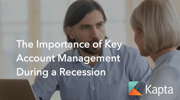Why Investing in Key Account Management is a Better Bet Than Investing in Sales Right Now
in Key Account Management /In business, as in everyday life, many of our decisions are based on the current state of the market. If you’ve looked at your portfolio recently, you’re probably well-aware that nobody quite knows what’s going to happen over the next quarter. From trade wars to tariffs, it seems like we could very well be facing another recession here soon. It’s been a good ride these last few years, but what goes up must come down. Are you prepared?
While you can minimize the impact of down economic times by spending less and hiring fewer people, you could prepare better by investing in one program: key account management.
Seems counterintuitive when operating in a new-sales-driven climate, but we believe there is a strong and compelling argument for reinvesting in your current customers over chasing the limited fish is the shrinking pond. Let’s take a closer look at why reinvesting in key account management is better than investing in sales right now.
Defense Wins Games
Everybody knows that although not as exciting as 50+ point shootouts, a strong defense can keep any team in check and can win the game for the team. Football analogies aside, when you have a strong defensive strategy and are bracing for the impending market downturn, you can minimize the damage and keep the score where it was.
Sure, it’s easy to assume that the best way to prepare for a recession is onboarding as many clients as possible, but this can be disastrous and ill-advised for a few reasons. Most importantly, it takes time, energy, and money to go after new clients. First, you have to do your research to find them. Then, you have to reach out to them hoping to schedule a meeting, After that is the pitch, then the follow-up calls, and if you play your cards right, they’ll sign on for your bottom-tier service plan. Is it really worth it in the end?
Sure, if you land a dozen new clients and they have promise of scaling at some point, yeah, it might be worth it, but what about the clients you already have?
Your Existing Customers Matter the Most
How much do your current clients matter to you? The mistake that too many organizations make during hard times is they panic, hire more sales reps, and put all of their focus into landing new names and building out their roster of clients. They think that now is the time to bring in some quick and easy revenue growth all while their existing customers fall to the wayside. This aggressive sales strategy rarely works out in the end. The problem is, your existing customers account for 70% of your revenue if you’re like most companies.
If leaders at the top care more about more clients and more brands, then they’re missing out on the big picture. You can’t buy loyalty, and if a customer has been with you for years, their needs should come first regardless of current economic conditions. Sure, it feels nice to celebrate when you land a new client in tough times, but just the thought of losing a long-term partner should make you rethink the entire strategy.
Think about how many new customers you’ve had come and go in a short period of time. You spend tons of effort and resources courting them and pitching them, and once they finally sign on, they’re gone in just a few months. You can’t reclaim all of that hard work, and once they’re gone, they’re likely gone for good. So, what about your existing customers that you put on the backburner for sales efforts?
The thing is, in hard economic times, every business is going to feel the burn in one way or another, and they’re all in panic mode. The last thing that most organizations want to do in a recession is subscribe to a new vendor when they either have one already or don’t see the value in it. It’s these times where your existing clients are your bread and butter, and if things take a turn for the worse, they might be your only revenue stream.
Existing Customers Buy More
How do existing customers make up roughly 70% of your revenue? Well, besides the monthly costs they pay, they will also purchase more premium products and services from you too. When you’re onboarding a new client, more times than not, they’ll go with your smallest package first before scaling and buying premium services. It can take months and sometimes years to convince a client to pull out their wallet and pay more, and in these tough times, it could be even more of a struggle with everyone tightening their belts across the board.
Your existing customers were fortunate enough to be with you during the good days, so they’ve already been through that. You don’t have to convince them that your services are worth it because they know that from experience, and if you’ve done your job right, you’ll have a strong relationship with them as well.
If you are a strategic partner for your clients and not just another vendor, you can enjoy a few luxuries. For one, you’ve shown time and time again that you fully understand their business, their wants, needs, goals, problems, and future challenges. You know what they need to succeed, and you’ve demonstrated through your work and the results you’ve enabled that you truly do care.
Another perk of being a strategic partner is that they trust you not to lead them astray. If you say that X premium service will help them reach Y more customers, they’ll believe you. If you were to have a sales rep make these same promises to a company that hasn’t even signed on or is still new, they’d think you’re just looking to take their money.
As a strategic partner for your clients, even in a recession, you can promote new products and services and show them how it will keep the momentum moving forward with their account. Essentially, selling to existing customers is much easier than selling to someone new, so playing defense and focusing on key account management is really a win-win across the board.
Key Account Management is About Unlocking Profits
What separates key account managers from the rest of the sales staff is they care more about the post-sale than the pre-sale. Sales reps have one job: get the client to sign the contract. After that, it’s the account manager’s job to keep the customer happy and satisfied with the product. With the right tools like Kapta, they can do this easily without having to bog themselves down in spreadsheets and multiple CRM systems.
These tools will prove invaluable in tough economic conditions because one wrong move and you could be in emergency mode, rushing to put out a fire. Clients are feeling the squeeze too, and if they have a legit reason to drop services in favor of either a new provider or because they don’t see the need anymore, you can say bye-bye to that revenue stream. For this reason, it’s all hands on deck in the key account management division, and it’s everyone’s job to communicate the value of their services to their customers, so they don’t even think about reconsidering when renewal season approaches.
In our experience, the best ways to communicate value is to reflect on past accomplishments and how they are related to your customer’s future goals, while also keeping your nose to the grindstone and not letting up. In a recession or slowing market, you can’t afford to sit back and relax. Now is the time to show your existing customers why you’re the best provider to go with and that anyone else in the marketplace won’t have nearly as much thought and care for their business and priorities.
Farming Relationships Over Hunting Clients
Blindly hiring “hunters” or sales reps isn’t logical. Considering the cost to pay these people, in a slowing market, the companies looking for services is a low number, and of those few organizations, only a small percentage might even take your call. This can lead to hunters taking whatever they can get, chasing unqualified leads that aren’t worth your time in the end.
You aren’t in the business of selling things and making a quick buck. You want to provide tangible value to every organization that you work with, and if a hunter overpromises to a non-qualified lead, it can come back to bite you.
For this reason and all of the others mentioned, you should focus on farming your existing clients, getting them to renew and scale, and pushing value in any way possible. By following this approach, you’ll greatly reduce the risk you face in the event of an economic downturn, and you can prepare for brighter days where the hunters might be more useful to your organization.
Summary
In tough economic times, it’s completely understandable to think that more is better. You might think, “If we can just get X number of clients or X client using our services, we’ll be able to weather the storm.” While this is partially true and having new clients is better than having none at all, focusing all of your efforts on hunting clients over farming the ones that you already have is a waste of resources, time, and energy.
Even if you land a handful of clients, you’re essentially starting at square one with them. They are still going to be skeptical about your organization and what your product or services can do for theirs. You might be skeptical of them as well. Will they renew? Are they going to be difficult to work with? Did your sales rep promise too much? All of these questions cause uncertainty and can lead to more stress than it’s really worth for a low-tier client that just signed on.
Your existing customers, however, know who you are and have seen great results in the time they have worked with you. You don’t need to convince them that you are their Strategic Partner because they already know that. With existing customers, it’s easier to sell them premium services, and it feels less like a sales pitch and more like a new opportunity for growth based on their previous experience.
Look, you’re not the only company that is worried about the economy as your clients are probably wringing their hands too. They want to survive the impending storm just as much as you, so they’ll be all ears if you can promise to help their business. Stay diligent and reinvest in your key account management efforts over hiring head hunters. When things turn around, you can go for other fish in the pond but for now, making sure that you’re holding onto your position and the 70% of the revenue your key accounts produce is the priority.
How Kapta Can Help
Kapta is an all-in-one enterprise key account management platform that enables you to do more for your biggest clients. Rather than being stuck switching between app to app, Kapta offers all of the tools that key account managers need in one place. With this convenience in mind, by integrating Kapta into your daily workflow, you can spend less time bogged down in spreadsheets and more time talking to your clients and building and nourishing your relationship with the people that matter most to your business. Built for key account managers by key account managers, Kapta takes the CRM model and elevates it with premium features like Voice of Customer (VOC) Insights and the account health score feature, so you know where you stand with your accounts at any moment.
To try a free demo of Kapta, schedule one here.







